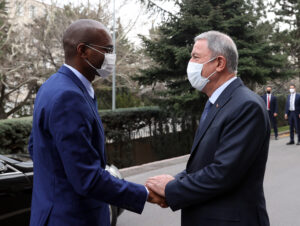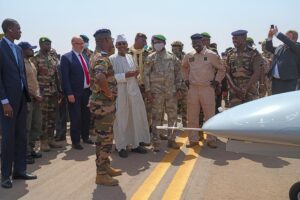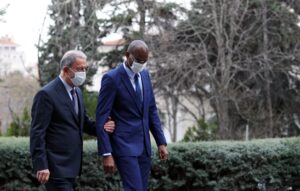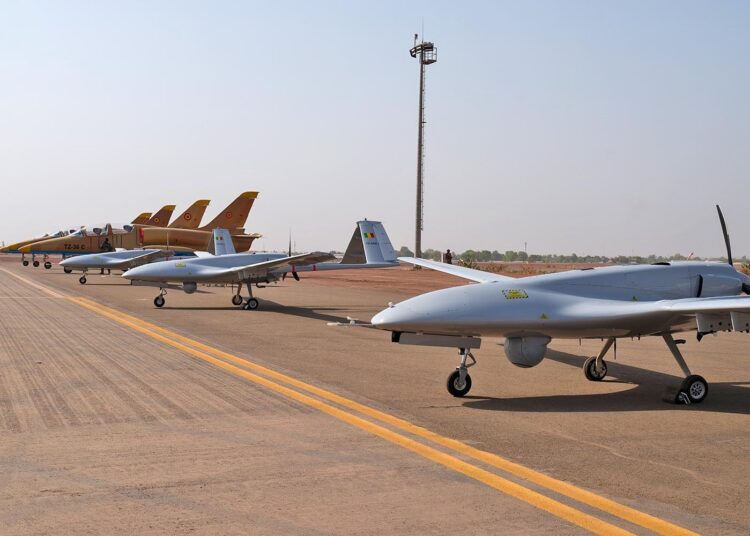Abdullah Bozkurt/Stockholm
The government of President Recep Tayyip Erdogan has expanded ties to officials of the African nation of Mali who were recently sanctioned by the US Treasury over what was described as malicious activities by the Russian mercenary group Wagner in the West African country.
The growing ties between Turkey and Mali’s military rulers have been cultivated in recent years through military aid, training, commerce and investment schemes, all of which are part of the Erdogan’s Islamist government’s campaign to curb Western influence in Africa, an objective also pursued aggressively by Russia and China.
Col. Sadio Camara, Mali’s minister of defense and one of three sanctioned officials, has forged close ties with Turkish government officials and procured military hardware from the NATO member state.
Camara and his team were hosted in Turkey in April of last year on a special invitation extended by his counterpart, then-defense minister Hulusi Akar, who now heads the parliamentary Defense Committee. During the meeting they discussed expanding military and defense cooperation between Turkey and Mali’s military government.

Turkey and Mali have signed a number of military and defense agreements in recent years. The Security Cooperation Agreement, signed in February 2015, envisions the development of both short and long-term projects focused on military training, technical support, material donation and consultancy. The agreement also includes provisions for intelligence and information exchange.
Another agreement, also signed in February 2015, establishes defense industry cooperation between Turkey and Mali. This agreement allows Turkey to sell surplus military goods, including arms and munitions, to Mali. Additionally, the agreement covers the modernization of the Malian military and promotes joint production and development of defense materiel.
Turkey and Mali have an existing military training cooperation agreement, which was amended in September 2010, enabling Turkey to train Malian military officers.
Text of the Turkey-Mali defense industry cooperation agreement:
Turkey has to date supplied Mali with several Bayraktar TB2 drones, which were showcased by the country’s military ruler at a ceremony held in March. The event was attended by both the Russian and Turkish ambassadors. Leading the ceremony were the head of the country’s junta, Col. Assimi Goita, and Mali’s air force chief, Gen. Alou Boi Diarra, who has been sanctioned by the US.
Photos from the ceremony were shared by Mali’s presidential office on Twitter, showing Turkey’s then-ambassador, Murat Mustafa Onart, standing alongside Goita. The images showed three Bayraktar drones lined up next to Russian Albatros L9 military planes. However, it is estimated that Mali has received a total of eight Turkish drones and is expected to acquire more in the future.
The Erdogan government saw the military coup on August 18, 2020 as an opportunity to expand its influence in Mali. Then-Turkish foreign minister Mevlüt Çavuşoğlu was the first high-level, non-African official to visit Mali since the coup despite the fact that international organizations including the UN, the EU, the African Union and the Economic Community of West African States (ECOWAS) strongly condemned the military action and called for the immediate restoration of the constitution.

Çavuşoğlu’s visit to Bamako on September 9, 2020 took place amid growing anti-French sentiment among the military rulers and was perceived as legitimizing the junta government. Furthermore, Çavuşoğlu’s point man in Africa, Ahmet Kavas, who was serving as the ambassador in Dakar at the time, described the coup as the beginning of an “African Spring.” Kavas, who played a significant role in shaping the Erdogan government’s policies for Africa, made controversial statements in 2013, stating that “al-Qaeda is not a terrorist organization” and accusing France of intentionally exaggerating the terrorist threat in Mali.
The Erdogan government’s interest in Mali, with the aim of curbing French influence and supporting Islamist groups that aligned with Turkey, dates back to 2013, when the French launched an operation to oust Islamic militants from the north of Mali. The operation followed United Nations Security Council Resolution 2085 of December 20, 2012 and an official request by the Malian interim government for French military assistance.
Text of the Turkey-Mali security cooperation agreement:
Turkey took a critical stance towards the military intervention, and President Erdogan described the operation as part of a Western attack on Mali, alleging it was driven by the desire to exploit the country’s rich gold reserves.
Turkey’s anti-French position has remained unchanged since then. In February 2018 Erdogan slammed French and other Western allies for killing civilians in Mali and other African nations. “You, immoral, unscrupulous, shameless [French & others]. It’s in your blood to kill civilians, not in Turks’ [blood]. You have done so in Rwanda, Mali, Corsica and Libya and still continue to do so,” Erdogan said in a campaign speech.
In an interview with state-run TV in December 2019, a year before the coup in Mali, Turkey’s outspoken president Erdogan accused France of interfering in Mali and said the French had no business being there. He further said he had directly conveyed this message to the French president.
French President Emmanuel Macron became a particular target of Erdogan, with the Turkish president referring to Macron as a “nut case” on several occasions in October 2020 and suggesting that he needed medical treatment. When Mali’s military rulers forced the departure of French troops last year, Erdogan welcomed the news.

Today, both Turkey and Russia share a common interest in expanding their influence in Mali at the expense of the West. In May a US intelligence document leaked to social media revealed that President Goita confirmed Mali’s potential acquisition of arms from Turkey on behalf of Russian military contractor Wagner. The document also said the Russian mercenaries had met with Turkish contacts in early February to discuss purchasing arms and equipment from Turkey
The claims in the intelligence document were partially verified by US State Department spokesman Matthew Miller, who said at a press briefing on May 22 that “Wagner has been attempting to purchase military systems from foreign suppliers and route these weapons through Mali as a third party,” without mentioning Turkey. The military hardware was intended for the use in Ukraine.
According to the US Treasury, Col. Camara was the key official responsible for planning and organizing the deployment of the Wagner Group in Mali. He made several trips to Russia in 2021 to finalize the agreement between Wagner and the Malian transition government for their deployment to Mali.

Col. Diarra, chief of staff of the Malian air force, played a significant role in facilitating the logistical movement of Russian entities in Mali. He accompanied Camara during visits to Russia and collaborated with Ivan Aleksandrovich Maslov, the US-sanctioned head of the Wagner Group in Mali.
Lt. Col. Adama Bagayoko, who was designated by the US Treasury, serves as the Malian Air Force deputy chief of staff and has also been sanctioned by the US. He is actively involved in securing the Wagner Group’s deployment to Burkina Faso. Moreover, Bagayoko is reportedly seeking to facilitate the Wagner Group’s access to gold mining opportunities in Mali.
According to the US, since the arrival of the Wagner Group in Mali in December 2021, the number of civilian casualties in the country has surged by 278 percent. Many of these civilian deaths resulted from operations conducted by the Malian Armed Forces in conjunction with members of the Wagner Group. In a report issued on Monday, Human Rights Watch also documented allegations of summary executions, lootings, forced disappearances and other abuses committed by Mali’s army in collaboration with Wagner.
Turkey, a country with an abysmal human rights record under the Erdogan government, remained silent to such atrocities committed by Mali’s military rulers.












